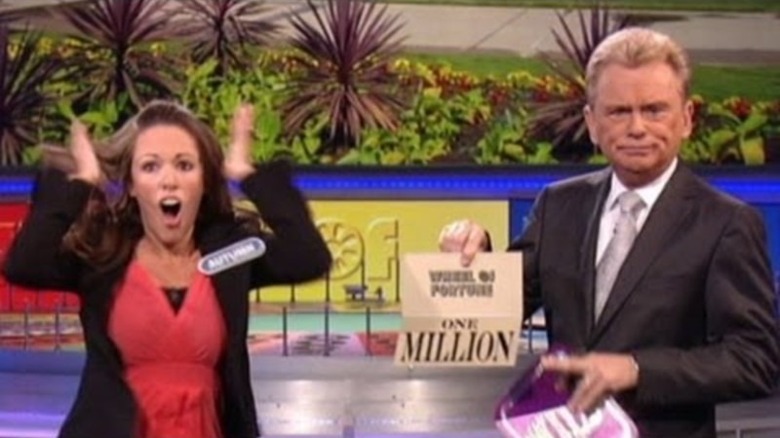What Winning A Million Dollars On Wheel Of Fortune Actually Means
You submitted the application. And then you nailed the audition. Now, while you're waiting to get "the call," you play endless rounds of Hangman, hoping to fine-tune those puzzle-solving, fill-in-the-letter skills. Why? Because when you get the call, you want to be in peak shape for your turn on "Wheel of Fortune." After all, there's $1 million to be won. The truth, though, is that getting the call to appear on one of America's favorite game shows is significantly easier than winning the game's big prize.
There have been many changes to its format since "Wheel of Fortune" first hit the air in 1975. The game show is now a nightly fixture, unlike its daytime origins. Contestants no longer have to spend their winnings after each round. And Vanna White can simply tap a letter's box instead of turning each one by hand. One of the more lucrative changes was the addition of the million-dollar wedge in 2008 (per Time). But, since its addition, only three contestants have won the prize. And that's exactly how the show wants it.
Spinning and winning a million dollars is harder than it looks
Winning the million-dollar prize is a somewhat convoluted process. A contestant must land on the wedge, which is bookended by a pair of the dreaded "Bankrupt" wedges. The contestant who lands on the million-dollar wedge during a round must also be the one to solve that round's puzzle, avoiding all Bankrupt wedges along the way. From there, the contestant must go on to win the entire game and enter the Bonus Round. Easy, right? Wait. There's more.
At the start of the Bonus Round, the player spins a smaller prize wheel with 24 prize envelopes, including the million-dollar envelope (which replaces the $100,000 prize). After selecting an envelope — without knowing its contents — the contestant must then solve the Bonus Round puzzle. Then, longtime host Pat Sajak opens the envelope and reveals the player's prize, which may or may not be $1 million. That's an awful lot of hoops to jump through, but should the contestant succeed, it's good practice for the many hoops the IRS will require when it comes time to pay tax on the winnings.

